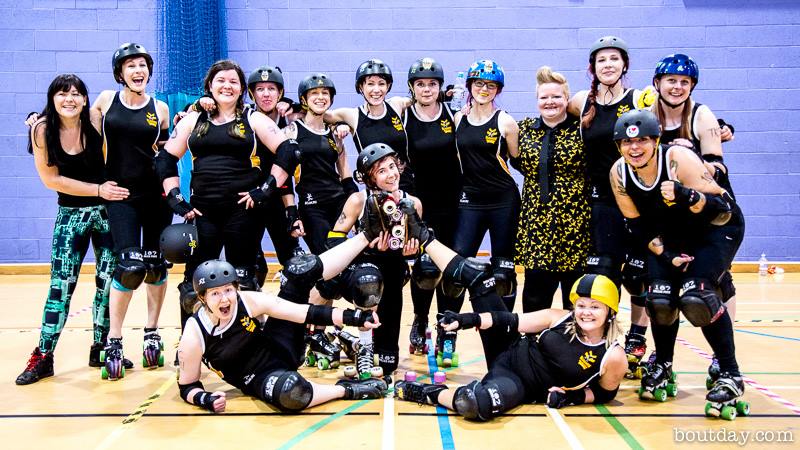The Digital Preservation community is growing. The DPC adding its 74th member this month (we’ve doubled in size over the past 5 years) is a good example of this. But it’s not just about absolute numbers. International Digital Preservation Day showed that the growth is multi-faceted, with geographical and sectoral expansion being the most obvious changes. Sooner or later we’re going to be confronted with a serious test: how can a small community become a big community while still being welcoming? Is it possible that we can learn from other communities? I’ve been thinking about how I can draw from my experiences beyond my work life to help answer these questions.
Roller Derby might seem like a strange place to start a blog post on diversity and why we should actively work to encourage it in the digital preservation community. It is, however, an essential part of the story of why this is an important issue for me, so hopefully it will all make sense shortly….
this is an important issue for me, so hopefully it will all make sense shortly….
I’ve bored some of you before stories of my previous involvement with this fast, fun and brash sport, but for those who haven’t heard about the modern incarnation of Roller Derby: it is a full contact sport played on quad roller skates. It’s been described in the past as rugby on roller skates and is only a little less insane than the sport James Caan played in the 1975 film Rollerball (if you want to see for yourself check out this video starring one of the sport’s top players, Loren Mutch). But how does it relate to diversity?
As well as the obvious attractions of being involved in such an exciting, female-led sport, one of the things I loved most about it was the commitment in the sport, at all levels, to supporting diversity. Starting as a grassroots sport, the idea that anyone could be involved, no matter their ethnicity, race, gender, gender identity, body type, age, disability, sexual orientation, physical appearance or religion (or lack thereof), has been enshrined in the community from the beginning. Every club has a policy supporting diversity and the sport’s governing body, the WFTDA’s, policies on issues such as gender have been held up as the gold standard for inclusion. Their gender policy basically boils down to this: you play roller derby according to the gender you identify as, no questions asked, no intrusive physical checks or hormone tests allowed. The focus is on acceptance and support, rather than questions and marginalisation. This approach is inspiring, and my life has been richer, and my world view much expanded, thanks to the wealth of different people I met through roller derby.
The ongoing strength and sustainability of the Roller Derby community builds it foundations on this openness to all, and there is increasing evidence that embracing diversity has a similar positive impact in the business world. A quick Google search on diversity in business will bring up numerous articles and studies quoting stats about the increased successes of organisations with a diverse workforce. These include figures such as an 80% improvement in business performance when levels of diversity and inclusion are high and a 3-9% increase in sales revenues for every 1% increase in the rate of gender or ethnic diversity in a workforce. It also been demonstrated as having a positive impact on innovation and problem-solving and in a field such as Digital Preservation this should make encouraging diversity essential.
These figures do, however, come with a disclaimer: taking a lip-service-only approach to diversity can lead to greater conflict and reduced productivity. Individuals must feel properly supported by management and their peers, and work must go into creating a real culture of understanding. This is where we get to what I think is the fundamental issue, we all feel more comfortable and perform better in an environment where we feel we are respected, understood and appreciated. Likewise, working with people who have different life experiences challenges us to think differently and helps us innovate. Being involved in a supportive and open community can lead us to find our best selves.
I don’t think anyone can deny that there is already a strong sense of community among those working in Digital Preservation. At last week’s 7th annual DPC Student Conference, this was a recurring theme throughout the day, and I can imagine as a student listening to the presentations and round table, I would feel greatly encouraged to pursue a career in such a supportive field. It’s also something we hear again and again from DPC Members, that one of the key benefits of membership is participation in the community that has been built by the Coalition. We are perhaps not the most diverse community as yet, but in my 10+ years of working in the field the trend has definitely been in the right direction.
I’m not sure at the moment exactly how we make sure this continues in the future, but the direction of our community is taking is encouraging. Projects like The National Archives ‘Bridging the Digital Preservation Gap’ are a good step in this direction, looking to bring new people to digital preservation from different and diverse backgrounds (it’s probably best if we’re not ALL archaeologists….)
As the DPC’s membership becomes more international and diverse, we also want to make sure respect and inclusion remain at the forefront of all our interactions, both with and between members. With this in mind we’ve been looking at developing a written commitment to this which will be published on the DPC website and included in the information circulated about all our events. It won’t be a ‘Code of Conduct’ as we don’t want negative interactions to be the main focus (although harassment will be addressed) but will instead focus on how we will ensure the welfare of our members. We are committed to making sure they feel welcome, supported and encouraged, so that DPC spaces are a place were interesting and inspiring discussions can take place. We haven’t settled on the ideal name for this document yet but if you have any suggestions or, indeed, about what should be included, please do get in touch.
The DPC is our members and we need to make sure we maintain a positive environment for both those who have already joined as well as those who may in the future.
Photo of Glasgow Roller Derby's Maiden Grrders by Dave McAleavy - http://boutday.com/













































































































































